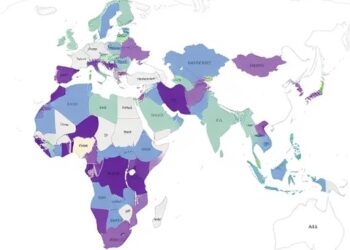Minimum pricing can be very effective in reducing demand for cheap high-strength alcohol amid concerns about affordability fuelling problematic drinking – according to a study on the impact of the measure during the COVID lockdown.
Minimum pricing can be very effective in reducing demand for cheap high-strength alcohol amid concerns about affordability fuelling problematic drinking – according to a study on the impact of the measure during the COVID lockdown.
The research, led by the University of East Anglia (UEA), examined the efficacy of minimum unit pricing (MUP) to help curb excessive consumption following the outbreak of the pandemic in 2020.
As a flat-rate form of minimum prices applying to all alcohol products based on their alcohol content, Scotland and Wales were among the first countries in the world to implement a MUP policy in 2018 and 2020, respectively.
The study draws on the policy differences of the four constituent countries of the UK but focuses primarily on Wales – because of the introduction of its MUP in March 2020 as the lockdown restrictions started – and compares it with England where MUP has been considered but not implemented.
The findings, published today in the journal Economic Inquiry, show that the introduction of MUP in Wales resulted in a 15% increase in transaction prices and a sharp reduction in the relative amount of alcohol bought, around 20%, with an overall drop in expenditure per customer, compared to England over the same period.
Lead author Prof Farasat Bokhari, previously of UEA’s School of Economics and now at Loughborough University, said: “The timing of the introduction of MUP was a coincidence for Wales, but presented an opportunity to compare the effects at the pandemic outset when problems with excessive consumption of cheap alcohol can be more acute.
“Lockdown restrictions in a pandemic may slow viral transmission but disrupt livelihoods and lifestyles that might encourage harmful behaviour changes, including problematic drinking fuelled by cheap alcohol.
“We find the MUP policy is remarkably effective and well-targeted in reducing demand, with consumers overall buying and spending less.”
Prof Bokhari and his co-authors suggest there is the risk that this could be only a short-term effect, where the sudden jump in the cheapest alcohol prices initially put off consumers faced with ‘sticker shock’, but who might later adjust their expectations and start buying the products again.
However, this is not the pattern they observed over the full six months after the MUP introduction in Wales. Similarly, as in Scotland, MUP appears to have had a persistent demand-dampening effect on cheap alcohol.
Prof Paul Dobson, of UEA’s Norwich Business School, added: “It is unlikely that our results are simply driven by an extensive increase in cross-border trade activity, given the ‘stay at home’ orders issued by the authorities during COVID-19 that limited the opportunities to make cross-border shopping trips.
“We also found little demand spillover towards more expensive products, with consumers overall buying and spending less as desired, indicating that the policy is very well-targeted even in times of heightened demand.”
The research used weekly retail data on take-home alcohol sales for 18 months before and six months after the introduction of MUP in Wales.
In total, this covered more than 2,500 alcohol products sold in all four countries, allowing the team to analyse in detail the impact of MUP and lockdown drinking on beers, ciders, spirits, wines, and other product types.
Wales and Scotland used their devolved powers to introduce the same MUP, at fifty pence per alcohol unit (50ppu), applicable to all beverages. In contrast, England and Northern Ireland have so far not adopted such a policy, while Scotland also has a ban on multibuy discounts and in-store display restrictions on alcohol.
‘Lockdown drinking: The sobering effect of price controls in a pandemic’, Farasat Bokhari, Ratula Chakraborty, Paul Dobson and Marcello Morciano, is published in Economic Inquiry on June 6, 2024.
Journal
Economic Inquiry
Method of Research
Data/statistical analysis
Article Title
Lockdown drinking: The sobering effect of price controls in a pandemic
Article Publication Date
6-Jun-2024




